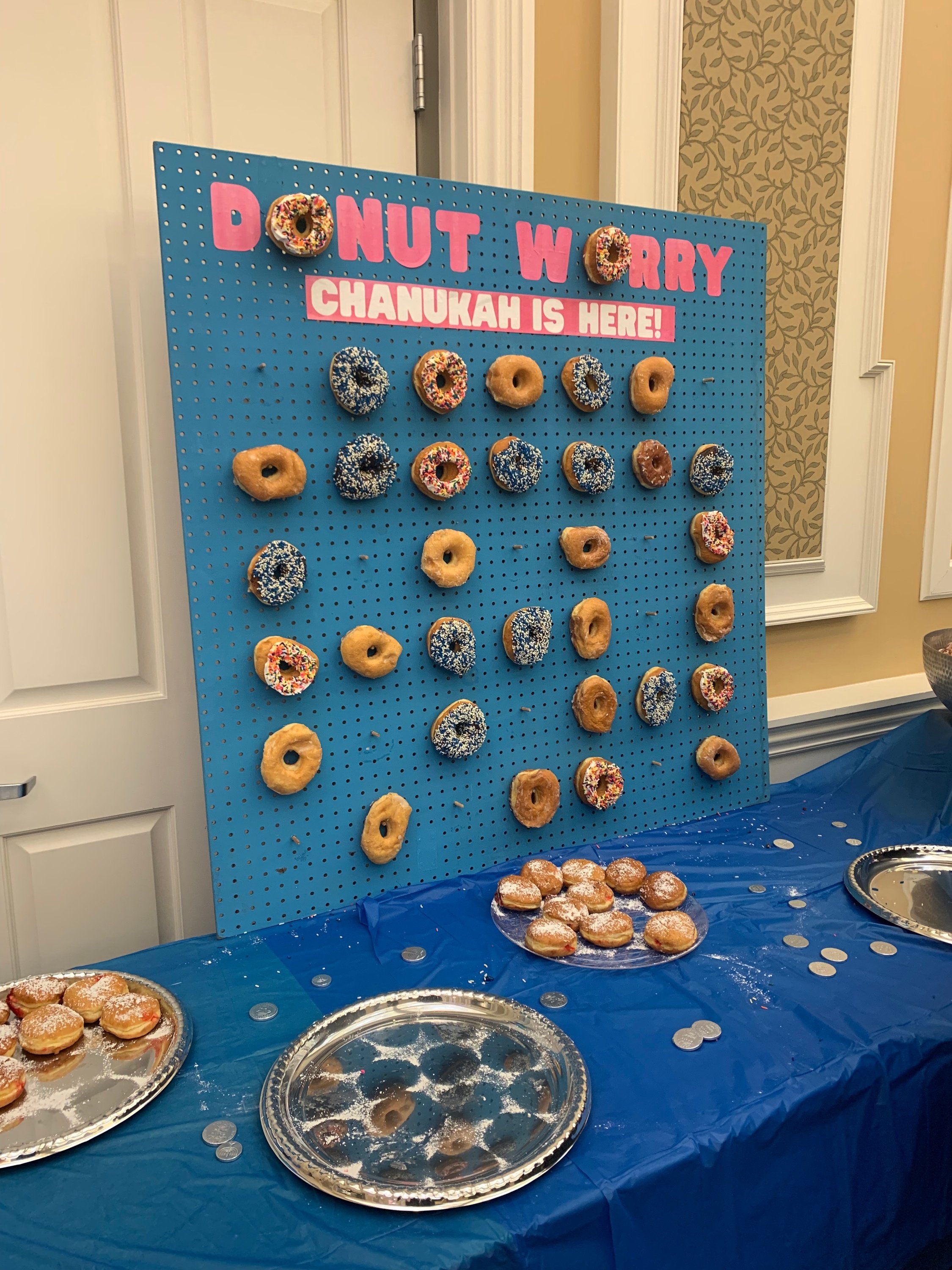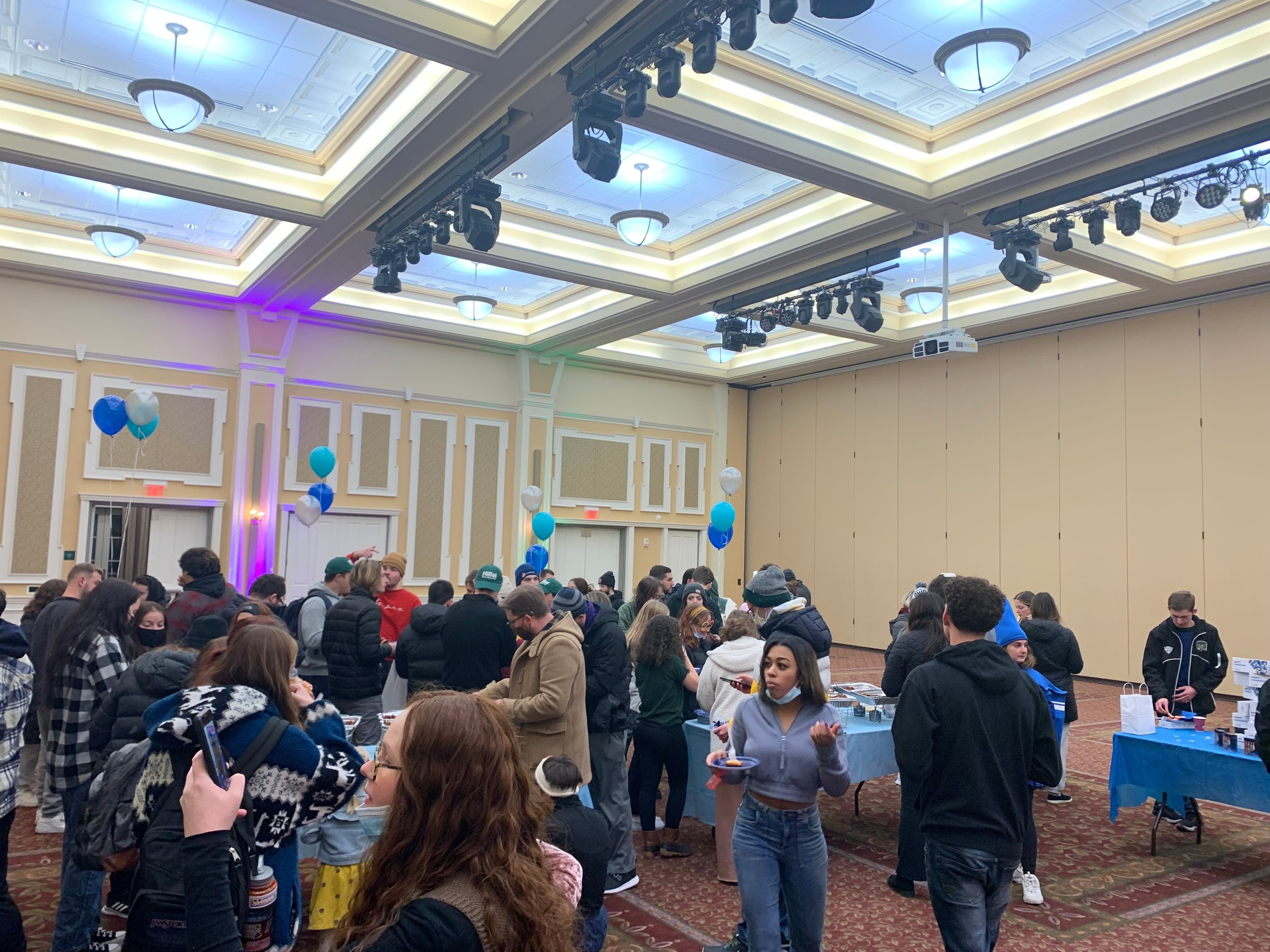Judaism on Campus
Story by Josie Donohue & McKenna Christy
Photos by Dylan Benedict
OU’s Jewish Community accentuates diversity and religious freedom on campus and encourages everybody, followers and non-followers of Judaism, to attend weekly and annual events.
The Hillel Ohio University building in Athens, Ohio, on Tuesday, Jan. 18th, 2022.
Ohio University is made up of a diverse set of people from many different cultures, communities and religious groups. One important religious group on campus is the body of Jewish students, faculty and community members.
OU’s Jewish community creates spaces of inclusivity by practicing Judaism through participation in two major organizations on campus: Hillel and Chabad.
Joy Duke, a third-year student taking a gap year studying education, is the Vice President of Chabad.
“I walk in and all my friends are there and we're all there for the same reason because we love our community and our religion,” Duke says.
Hillel is located on 21 Mill St. and Chabad is located at 33 N Court St. in Athens. Although the organizations are located on different streets, they both provide Jewish students on campus with resources to practice Judaism and connect with Jewsih heritage, history and culture.
The Hillel Ohio University building in Athens, Ohio, on Tuesday, Jan. 18th, 2022.
The Hillel Ohio University webpage states: “We serve the Ohio University campus community in areas of Jewish culture, education, history, social service, Israel advocacy and communal experiences.”
Both organizations welcome anyone with or without a Jewish identity to participate in events offered throughout the year. One of the events that takes place weekly is Shabbat.
Shabbat is a Jewish religious holiday hosted every Friday by Hillel and Chabad. Shabbat is Hebrew for the Sabbath and is considered a day of rest originating from the creation story in the Torah. Shabbat starts on Friday evening and ends on Saturday evening with a service called Havdalah, according to the Reform Judaism website.
Along with weekly Shabbat, students at OU are also welcomed to attend events throughout the school year. Events include game and movie nights, craft making and community service outreach, according to the Hillel Instagram page.
Duke grew up attending Shabbat in her hometown and now attends the weekly meetings as much as possible.
“[There is] just like a sense of family for me,” Duke says. “Especially when I first came to college and I was feeling homesick, [Shabbat] was the one thing that I always had and it's nice.”
Shabbat is just one of the holidays celebrated by Jews. One widely known Jewish holiday celebration is Hanukkah.
Students, faculty, staff and friends, Jewish and non-Jewish alike, gathered to light the first and second candles of a giant menorah on Nov. 29, 2021 outside the fifth floor of Baker Center. President Hugh Sherman, Vice President of Diversity and Inclusion Dr. Gigi Secuban and Rabbi Levi Raichik, the director of Chabad at OU all attended the event.
Sherman opened the ceremonies and joined Rabbi Levi Raichik in lighting the first candle of the menorah.
“This is a way for us to confirm Ohio University’s belief in religious freedom and acceptance of all religions,” Sherman says. “We are very happy to be here tonight to share this lighting with you all.”
One: A decorative donut sign at the Chanukah party on Nov. 29 in Baker Center. Two: Students, faculty, and guests enjoying Chanukah food and festivities in Baker Center after the lighting of a menorah to celebrate the holiday. Photos by Josie Donohue.
After lighting the menorah and taking a group photo, attendees entered Baker Center where the rest of the Chanukah festivities took place.
Despite this effort from the university to celebrate Jewish holidays and traditions, Grace Jarchow says it could do a better job at accommodating the religious community.
Jarchow is a freshman studying environmental chemistry. Last semester, Jarchow had trouble taking time off in class for Jewish religious holidays such as Yom Kippur and Rosh Hashanah because the faculty did not excuse her, claiming it was an “invalid” reason to miss class.
Jarchow and the Rabbi at Chabad talked to the ethics department to discuss the behavior of the faculty. Jarchow decided to eventually drop the class.
“It was one of those ‘sweep under the rug’ things before it blew up,” Jarchow says. “I didn’t like the way they handled that either to be honest.”
The OU website says students observing religious holidays may be excused from classes, but in Jarchow’s case, instructors can choose whether they want to honor it.
“The university could definitely do a better job of making their faculty and staff aware of important holidays and events that are going on outside of what shows up on the calendar like President’s day and Columbus Day,” Jarchow says.
If a student needs to be excused from a class for a religious holiday, they should provide an excuse in writing to the instructor at the start of the semester. Instructors should provide make-up work or reschedule tests to accommodate needs of students without penalty, according to the website.
Hadass Galili, a junior studying political science pre-law, says the organizations in place on campus provide enough resources for the Jewish community and she has not had trouble with missing class for a religious holiday.
“I'm not sure that OU needs to accommodate the Jewish community,” Galili says. “I think we do fine on our own. The only thing I’ve needed the university for is excused absences for holidays. OU does a good job at accommodating that, but that’s not specific to the Jewish community. I think it’s just a general religious accommodation.”
Students who practice Judaism or are interested in learning more can get involved in campus organizations such as the Jewish Women’s Organization, Bobcats for Israel or Alpha Epsilon Pi, which is the only international Jewish fraternity at OU.
Jarchow welcomes people who are unfamiliar or interested in Jewish culture to attend any of the events Chabad, Hillel or other Jewish student organizations host.
The Chabad Jewish Student Center in Athens, Ohio, on Tuesday, Jan. 18th, 2022.
“At Chabad I feel like they do a good job of welcoming everybody whether you’re Jewish or not, or whatever you identify as, they’re welcoming to all types,” Jarchow says.
Judaism is widely celebrated as an important and unique addition to the OU community. Galili says that not everyone will know everything about the religion, but it is important to be courteous of observers.
“We can all do our part to be respectful of everyone and for every facet of diversity,” Galili says.





